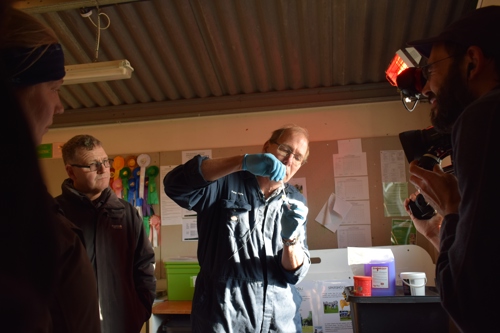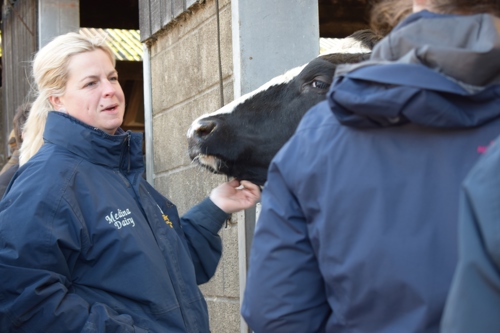

The aim of the field lab is to reduce antibiotic usage in dairy farms through selective treatment of clinical mastitis using a new on farm culture test kit (MastDecide).
This new test system has previously had very little direct farmer testing. Participants in this field lab want to see whether it can be used by farmers as a practical and effective tool to significantly reduce antibiotic usage without affecting animal welfare and mastitis outcome parameters.
While sensitivity and specificity of this test have recently been established under controlled conditions, there was previously no work published on the suitability of such a system in real farm conditions.
The group are also evaluating the general concept of on farm culture and selective treatment in more detail, comparing cows treated according to culture results with those treated conventionally with regards to their mastitis outcome parameters.
The long-term plan is also to evaluate the time and cost investment by the farmer in using on farm testing and whether they are willing to adopt the technique long term.

Farmers receive an incubator (partially subsidised) and are trained by their local vets who themselves receive a training session in the concept behind and use of the test kit.
The farmers in the group then use the test kit on half of the mastitis cases in their herd and treat the other half conventionally.
An accredited lab is carrying out routine culture on the samples and confirming the species by a mass spectrometry test (Maldi-Tof).
Vets submit the details of the cases and electronic farm data on mastitis and milk quality to the researcher.
The researcher compares the on farm culture results with the external lab results and the blanket treated and cultured cases with regards to mastitis outcome parameters.
For further information on the background and methods of the trial please go to the Results & Reports section of the field lab page.
Interim results from the field lab show that, for those farms where the conditions are appropriate for this treatment, on-farm tests reduce antibiotic use in infected animals by an average of 35%. If used on half the UK’s dairy farms this could lead to a yearly reduction of around 120,000 antibiotic doses.

On an average herd (250 animals) 31 cows would not need treatment. This means the average organic dairy farm could save around £2,200 by avoiding wasted milk lost from treated cows where milk cannot be sold, and £400 in antibiotic treatments, adding to savings of £2,600. Non-organic farms could save £600 by avoiding wasted milk and £400 in antibiotic treatments.
There are no updates at this time.
Please check back later.
The actual project timeline is affected by factors including weather so may differ.
April 2019
July 2022
Expected May 2023

Soil Association
South West England
Specialist in animal welfare; dairy and sheep farming experience; former farm business consultant and advisor on agri-environment schemes and conservation; Animal Welfare Advisor on AssureWel, Soil Association. Kate is assisting in group co-ordination and additionally working on another project (RELACS) focusing on antibiotic reduction and udder health. This field lab with provide beneficial information to the farmers in the RELACS project.

Royal Veterinary College